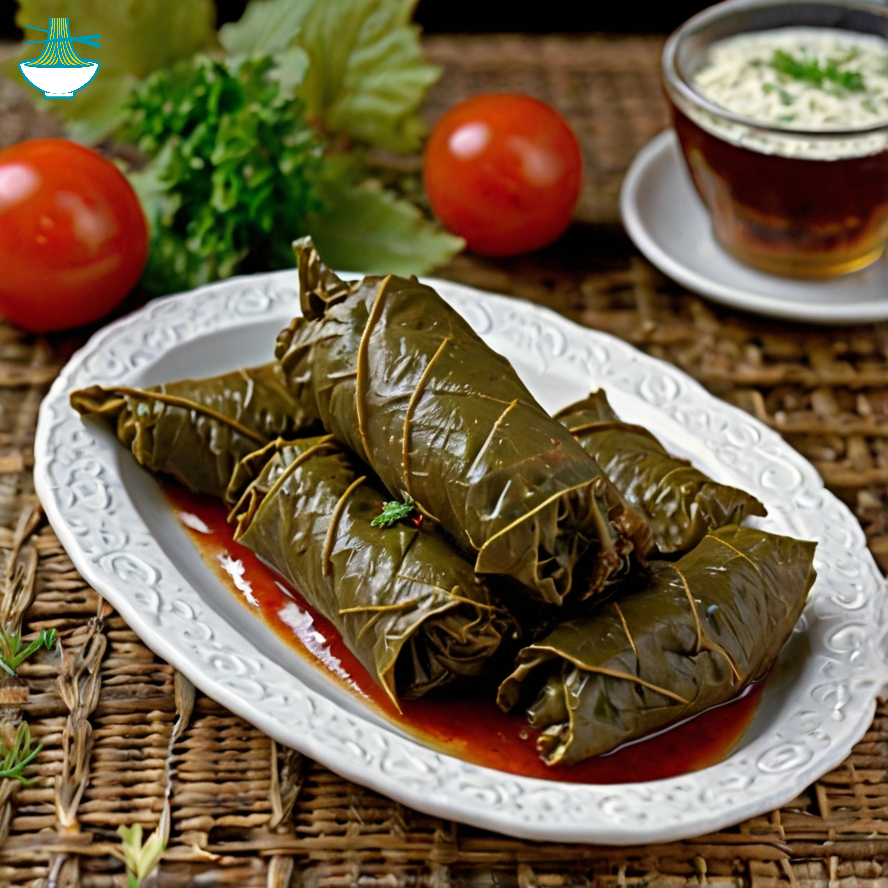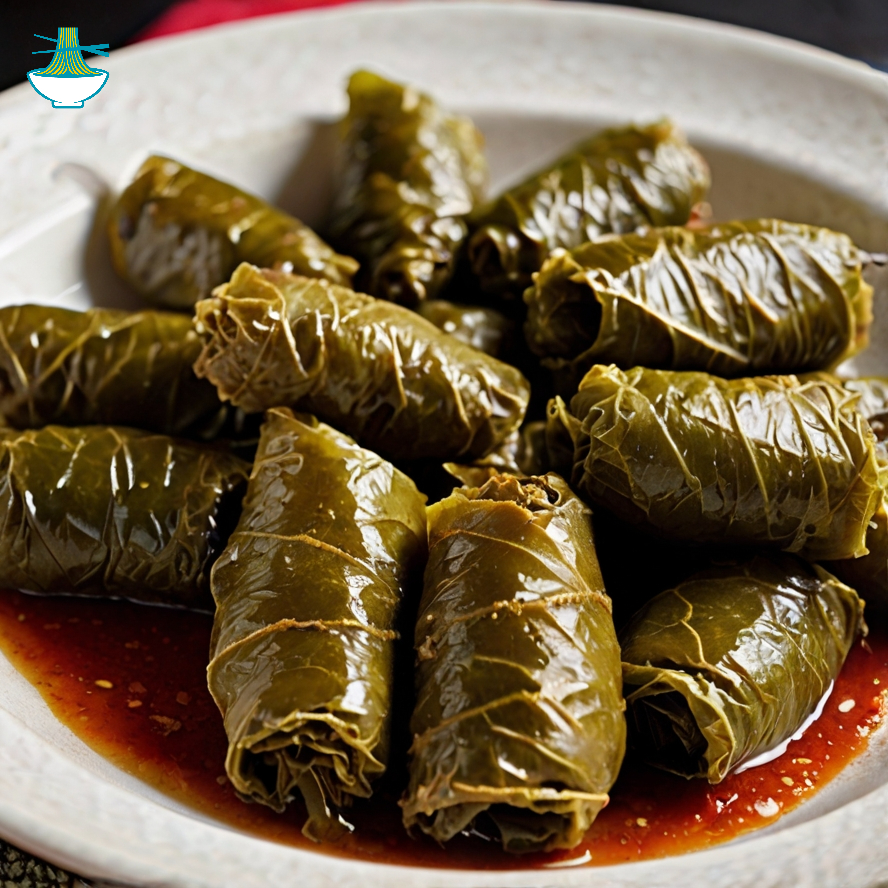Cyprus Koupepia, also known as stuffed grape leaves, is a cherished dish in Cypriot and Mediterranean cuisine. This flavorful dish features grape leaves enveloping a savory filling of rice, herbs, and optionally meat. Cooked in a rich tomato-based sauce, Koupepia offers a delightful blend of textures and flavors, making it a versatile option for both main courses and appetizers.

Koupepia has deep roots in Mediterranean culinary traditions. Known in various regions under different names, such as Dolmas in Greece and Sarma in Turkey, this dish reflects the region's rich history of utilizing local ingredients and preserving foods. The practice of stuffing grape leaves can be traced back to ancient times, showcasing a tradition of combining fresh produce with aromatic spices.
Ingredients:
- 1 jar of grape leaves (about 60-70 leaves)
- 500g ground beef or lamb (optional)
- 1 cup medium-grain rice
- 1 large onion, finely chopped
- 2-3 cloves garlic, minced
- 1/4 cup fresh parsley, finely chopped
- 1/4 cup fresh mint, finely chopped
- 1/4 cup fresh dill, finely chopped
- 1/4 cup fresh cilantro, finely chopped
- 1/4 cup olive oil
- 2 tablespoons tomato paste
- 2-3 ripe tomatoes, chopped
- Salt and pepper to taste
- 1-2 cups water or chicken broth
Instructions:
1. Prepare the Grape Leaves: Rinse grape leaves thoroughly. Blanch them in boiling water for 2-3 minutes to soften. Drain and set aside.
2. Prepare the Stuffing: In a bowl, combine ground beef or lamb (if using), rice, onion, garlic, and herbs. Season with salt and pepper.
3. Stuff the Grape Leaves: Place a tablespoon of stuffing in the center of each grape leaf. Fold the sides over the stuffing and roll tightly. Repeat with remaining leaves and stuffing.
4. Make the Sauce: Heat olive oil in a pot. Add chopped tomatoes and tomato paste, cooking until tomatoes soften. Add water or chicken broth and stir.
5. Cook the Koupepia: Arrange stuffed grape leaves seam side down in the pot. Cover and simmer on low for 45-60 minutes, until rice is cooked and leaves are tender.
6. Serve: Transfer Koupepia to a platter, spoon sauce over the top, and serve hot.
Notes:
- For added texture, incorporate pine nuts or currants into the stuffing.
- Koupepia can be enjoyed as a main course or appetizer.
- Refrigerate leftovers for up to 3-4 days.

Nutrition Value:
1. 1 jar of grape leaves (about 60-70 leaves)
- Calories: Approximately 60-70 calories per serving (about 5-10 leaves)
- Carbohydrates: 14 grams
- Protein: 2 grams
- Fat: 0.5 grams
- Sodium: 200 mg
- Cholesterol: 0 mg
- Vitamins: Rich in vitamin A and vitamin K
- Minerals: High in calcium and iron
- Nutritional Benefit: Grape leaves are low in calories and provide a good source of vitamins and minerals. They support bone health, immune function, and have antioxidant properties.
2. 500g ground beef or lamb (optional)
- Calories: Approximately 1,250 calories
- Carbohydrates: 0 grams
- Protein: 85 grams
- Fat: 100 grams
- Sodium: 270 mg
- Cholesterol: 300 mg
- Vitamins: High in B vitamins, especially B12 and niacin
- Minerals: Good source of iron, zinc, and phosphorus
- Nutritional Benefit: Provides a significant amount of protein and essential nutrients for muscle growth and repair. It also contributes to overall energy levels and supports immune function.
3. 1 cup medium-grain rice
- Calories: 200 calories
- Carbohydrates: 45 grams
- Protein: 4 grams
- Fat: 0.5 grams
- Sodium: 0 mg
- Cholesterol: 0 mg
- Vitamins: Contains small amounts of B vitamins
- Minerals: Provides magnesium and selenium
- Nutritional Benefit: A good source of energy due to its high carbohydrate content. It supports digestive health and provides essential minerals.
4. 1 large onion, finely chopped
- Calories: 60 calories
- Carbohydrates: 14 grams
- Protein: 1 gram
- Fat: 0 grams
- Sodium: 5 mg
- Cholesterol: 0 mg
- Vitamins: High in vitamin C
- Minerals: Contains potassium and manganese
- Nutritional Benefit: Onions are rich in antioxidants and have anti-inflammatory properties. They support heart health and help in maintaining a healthy immune system.
5. 2-3 cloves garlic, minced
- Calories: 13 calories
- Carbohydrates: 3 grams
- Protein: 0.5 grams
- Fat: 0 grams
- Sodium: 1 mg
- Cholesterol: 0 mg
- Vitamins: Good source of vitamin C and B vitamins
- Minerals: Contains manganese and calcium
- Nutritional Benefit: Garlic has anti-inflammatory and antibacterial properties. It can boost the immune system and support cardiovascular health.
6. 1/4 cup fresh parsley, finely chopped
- Calories: 6 calories
- Carbohydrates: 1 gram
- Protein: 0.5 grams
- Fat: 0 grams
- Sodium: 10 mg
- Cholesterol: 0 mg
- Vitamins: Excellent source of vitamins A, C, and K
- Minerals: High in iron and potassium
- Nutritional Benefit: Parsley is rich in antioxidants and vitamins. It supports digestion, provides immune support, and has anti-inflammatory properties.
7. 1/4 cup fresh mint, finely chopped
- Calories: 6 calories
- Carbohydrates: 1 gram
- Protein: 0.5 grams
- Fat: 0 grams
- Sodium: 2 mg
- Cholesterol: 0 mg
- Vitamins: Contains vitamins A and C
- Minerals: Provides iron and calcium
- Nutritional Benefit: Mint aids digestion, provides a refreshing taste, and has antioxidant properties that support overall health.
8. 1/4 cup fresh dill, finely chopped
- Calories: 5 calories
- Carbohydrates: 1 gram
- Protein: 0.5 grams
- Fat: 0 grams
- Sodium: 2 mg
- Cholesterol: 0 mg
- Vitamins: Good source of vitamin A and C
- Minerals: Contains calcium and manganese
- Nutritional Benefit: Dill supports digestive health, provides antioxidant benefits, and can aid in reducing inflammation.
9. 1/4 cup fresh cilantro, finely chopped
- Calories: 1 calorie
- Carbohydrates: 0.5 grams
- Protein: 0.1 grams
- Fat: 0 grams
- Sodium: 1 mg
- Cholesterol: 0 mg
- Vitamins: Excellent source of vitamin C and K
- Minerals: Contains potassium and calcium
- Nutritional Benefit: Cilantro aids in detoxification, supports digestive health, and provides essential vitamins and minerals.
10. 1/4 cup olive oil
- Calories: 480 calories
- Carbohydrates: 0 grams
- Protein: 0 grams
- Fat: 54 grams
- Sodium: 0 mg
- Cholesterol: 0 mg
- Vitamins: Contains vitamin E
- Minerals: Provides iron and calcium
- Nutritional Benefit: Olive oil is rich in monounsaturated fats and antioxidants. It supports heart health, reduces inflammation, and enhances the flavor of dishes.
11. 2 tablespoons tomato paste
- Calories: 30 calories
- Carbohydrates: 7 grams
- Protein: 1 gram
- Fat: 0 grams
- Sodium: 300 mg
- Cholesterol: 0 mg
- Vitamins: Contains vitamin C
- Minerals: Provides potassium and iron
- Nutritional Benefit: Tomato paste is concentrated with antioxidants like lycopene, which supports heart health and may reduce the risk of certain cancers.
12. 2-3 ripe tomatoes, chopped
- Calories: 50 calories
- Carbohydrates: 11 grams
- Protein: 2 grams
- Fat: 0 grams
- Sodium: 10 mg
- Cholesterol: 0 mg
- Vitamins: Rich in vitamins A and C
- Minerals: Provides potassium and folate
- Nutritional Benefit: Tomatoes are high in antioxidants and vitamins. They support heart health, improve skin health, and may reduce the risk of chronic diseases.
13. Salt and pepper to taste
- Salt: Adds sodium (varies based on amount used)
- Pepper: Minimal calories and nutritional content but adds flavor
14. 1-2 cups water or chicken broth
- Water: No calories or nutrients, provides hydration
- Chicken Broth: Approximately 15-20 calories per cup, contains sodium and small amounts of protein
- Nutritional Benefit: Water is essential for hydration; chicken broth adds flavor and can provide some nutrients depending on preparation.
This information covers the nutritional aspects and benefits of each ingredient in the recipe.


Comments